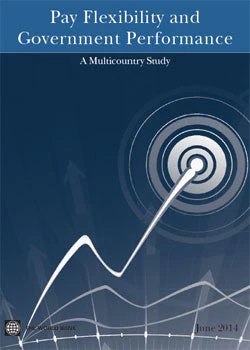 A new publication on Pay Flexibility and Government Performance[1] finds that, in this area as in so many aspects of public sector management, practitioners are hampered by a lack of high quality evidence, particularly for PRP in core administrative public sector jobs. The publication draws on a two sets of data: a review of the literature on Performance-Related Pay in the Public Sector[2] which disaggregates the available evidence by the different public sector contexts, the different types of public sector jobs, the quality of the empirical study, and the economic context; and case studies of PRP in emerging market and OECD countries, which included large perception surveys of government officials.
A new publication on Pay Flexibility and Government Performance[1] finds that, in this area as in so many aspects of public sector management, practitioners are hampered by a lack of high quality evidence, particularly for PRP in core administrative public sector jobs. The publication draws on a two sets of data: a review of the literature on Performance-Related Pay in the Public Sector[2] which disaggregates the available evidence by the different public sector contexts, the different types of public sector jobs, the quality of the empirical study, and the economic context; and case studies of PRP in emerging market and OECD countries, which included large perception surveys of government officials.
A related article in the World Bank Research Observer notes that this has not limited the remarkable certainty which opponents and proponents of PRP adopt concerning recommendations for reform. Opponents march behind populist banners such as that provided by Pink[3], appealing to the idea that monetary and other extrinsic incentives are both counterproductive (because they frequently undermine intrinsic incentives) and unnecessary (because intrinsic incentives can be harnessed and used to maximize individual productivity).
Proponents argue that if the vast majority of OECD governments are doing this, then there must be something to it.[4] Both are drawing on a weak set of data that can be summarized like this:
- The overall body of evidence paints a generally supportive picture of performance pay in most jobs (61% of 153 studies examined);
- When the jobs in question are narrowed to those where the processes followed by staff are hard to observe, a situation very typical for many public sector administrative jobs (a la Wilson[5], these are “craft” or “coping” jobs), still 60% of the 110 studies find positive results;
- However, when focusing even more narrowly on “coping” jobs, which more closely resemble those found in the core civil service, the number of studies becomes trivial, and there are none that assist in understanding the relevance of PRP to such jobs outside of the OECD.
The bottom line is that there is every reason to be more open about the possibility that performance-related pay has something to offer the public sector – but just as many reasons for modesty and cautious experimentation. (
Hasnain and Manning 2014) supplements literature review findings with detailed case studies examining pay flexibility (defined as a compound of performance-related pay initiatives and pay differentiation arrangements between agencies, career groups, and/or geographical locations which respond to the need to compete for specific skills in different labor markets). It suggests that while pay flexibility has often been ruled out a priori in World Bank and other donor advice in the past, there is justification for some experimentation by job family – or, in situations where successive generations of pay reforms have led to somewhat inchoate pay strategy, some experimentation by entity. In both cases, “learning as you go” is a better message than self-righteous ex ante certainty.
[1] Hasnain, Z. and N. Manning (2014), Pay Flexibility and Government Performance, Washington DC, World Bank.
[2] Hasnain, Z., N. Manning, et al. (2012). Performance-Related Pay in the Public Sector: A Review of Theory and Evidence (World Bank Policy Research Working Paper 6043). World Bank, Washington DC
[3] Pink, D. H. 2009. Drive: the surprising truth about what motivates us. New York: Riverhead.
[4] Currently, 28 of the 34 OECD countries have introduced PRP in some form (OECD 2011. Government at a Glance. Paris: OECD.)
[5] Wilson, J. Q. 1989. Bureaucracy: What Government Agencies Do and Why They Do It. New York: Basic Books.




Join the Conversation